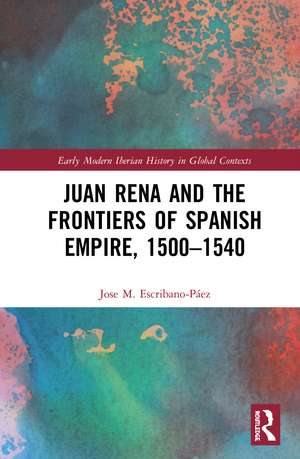Juan Rena and the Frontiers of Spanish Empire, 1500–1540: Early Modern Iberian History in Global Contexts
Autor Jose M. Escribano-Páezen Limba Engleză Hardback – 15 iun 2020
| Toate formatele și edițiile | Preț | Express |
|---|---|---|
| Paperback (1) | 310.99 lei 6-8 săpt. | |
| Taylor & Francis – feb 2022 | 310.99 lei 6-8 săpt. | |
| Hardback (1) | 1001.07 lei 6-8 săpt. | |
| Taylor & Francis – 15 iun 2020 | 1001.07 lei 6-8 săpt. |
Preț: 1001.07 lei
Preț vechi: 1220.81 lei
-18% Nou
Puncte Express: 1502
Preț estimativ în valută:
191.58€ • 199.76$ • 159.22£
191.58€ • 199.76$ • 159.22£
Carte tipărită la comandă
Livrare economică 20 martie-03 aprilie
Preluare comenzi: 021 569.72.76
Specificații
ISBN-13: 9780367460815
ISBN-10: 0367460815
Pagini: 248
Ilustrații: 24
Dimensiuni: 152 x 229 x 16 mm
Greutate: 0.48 kg
Ediția:1
Editura: Taylor & Francis
Colecția Routledge
Seria Early Modern Iberian History in Global Contexts
Locul publicării:Oxford, United Kingdom
ISBN-10: 0367460815
Pagini: 248
Ilustrații: 24
Dimensiuni: 152 x 229 x 16 mm
Greutate: 0.48 kg
Ediția:1
Editura: Taylor & Francis
Colecția Routledge
Seria Early Modern Iberian History in Global Contexts
Locul publicării:Oxford, United Kingdom
Public țintă
Postgraduate and UndergraduateCuprins
Introduction 1. Defining the Frontier: Juan Rena’s Network and Spanish Expansion into the Maghreb 2. The Making of a Frontier: Noble Authority and Jurisdictional Pluralism Between Southern Iberia and the Maghreb 3. Political Incorporation from Below: Juan Rena and the Integration of Navarre into the Spanish Empire 4. Constructing a Maritime Frontier: Politics and Sea Power in the Mediterranean World During the Age of Charles V. Conclusion
Notă biografică
Jose M. Escribano-Páez is Marie Skłodowska-Curie Fellow at the Universidad Pablo de Olavide, where he also teaches modules on Early Modern History and Imperial History.
Recenzii
"Escribano-Páez has delivered an important contribution to understanding the early development of Spanish administration on imperial frontiers, and it is a particularly significant next step in the advancement of the histories of Spanish-North Africa and Navarra."
Yuen-Gen Liang Institute of History and Philology, Academia Sinica, Taiwan
"Escribano-Páez takes us on a journey that allows us to re-evaluate the Mediterranean frontier not as an aseptic zone, but as an important laboratory of experiences, practices and norms with which to rethink the history of the empires of the early modern age through the eyes of those who acted on the ground."
Francesco Caprioli Università degli Studi di Milano, Italy
"From Andalusia to the Maghreb, from the Pyrenees to the Eastern Mediterranean, Rena's life story helps Escribano-Páez to show that, in contrast to certain triumphalist and outdated visions of Hispanic hegemony, the greatest challenge facing the Monarchy in the early 16th century was not so much to conquer as to develop strategies that would guarantee the maintenance of its new possessions."
David Martín Marcos Universidad Nacional de Educación a Distancia, Spain
Yuen-Gen Liang Institute of History and Philology, Academia Sinica, Taiwan
"Escribano-Páez takes us on a journey that allows us to re-evaluate the Mediterranean frontier not as an aseptic zone, but as an important laboratory of experiences, practices and norms with which to rethink the history of the empires of the early modern age through the eyes of those who acted on the ground."
Francesco Caprioli Università degli Studi di Milano, Italy
"From Andalusia to the Maghreb, from the Pyrenees to the Eastern Mediterranean, Rena's life story helps Escribano-Páez to show that, in contrast to certain triumphalist and outdated visions of Hispanic hegemony, the greatest challenge facing the Monarchy in the early 16th century was not so much to conquer as to develop strategies that would guarantee the maintenance of its new possessions."
David Martín Marcos Universidad Nacional de Educación a Distancia, Spain
Descriere
This book examines the political construction of imperial frontiers from below during the reigns of Ferdinand the Catholic and Charles V in the Iberian Peninsula and the Mediterranean, focusing on the activities of one of their most reliable agents in this task: Juan Rena (1480–1539).









